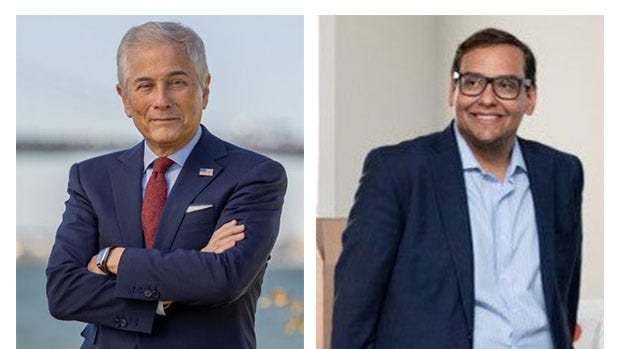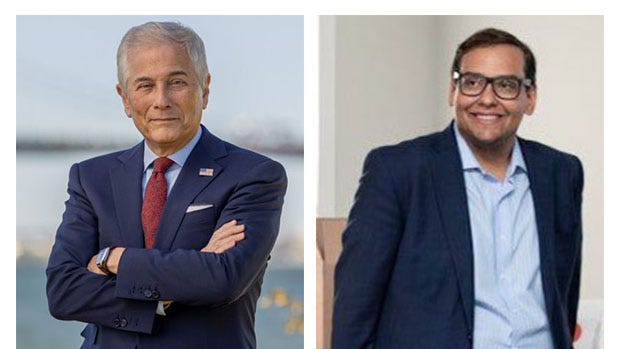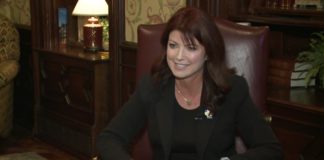
When Robert Zimmerman was growing up in Long Island, New York, in the ’70s, he spent Friday nights hiding out at diners.
“I didn’t want to admit to my folks I didn’t have a date for a dance,” he said.
Now 68, Zimmerman is an openly gay man who has experienced firsthand a changing social climate both in his neighborhood and nationally. And he’s helping lead further progress, as the Democratic nominee in the first congressional race between two openly gay candidates.
Come Nov. 8, Zimmerman faces Republican George Santos for New York’s 3rd Congressional District, representing Queens and Long Island.
Their race is one in an election cycle with the highest number of openly LGBTQ candidates across the country — 1,008 LGBTQ people had announced their candidacy as of this July, according to Victory Fund, a nonpartisan organization supporting LGBTQ candidates for public office. This is up just slightly from the 2020 cycle that saw 1,0006 LGBTQ candidates, and sharply up compared to 2018’s 716.
Of those who ran in primaries or are still running for Congress this year, 101 identify as LGBTQ, Victory Fund reported. Four are Republicans, while the majority run as Democrats.
There are 11 openly LGBTQ members of Congress, with New York having the most of any state at three. In the country’s history, Victory Fund reports there have been 19 openly LGBTQ people elected to the House and Senate.
Santos, a 34-year-old first generation American, was born in Jackson Heights in Queens and returned to the area a decade ago. He lives in the district’s Queens side now with his husband.
“Congress will soon be represented predominantly by millennials. I want to make sure that I am part of that group,” Santos said. This is his second run for the district seat. Santos faced the current Democratic Rep. Tom Suozzi during the Republican’s first run for office in 2020; he came in second by 12 points.
After a career working as a congressional senior staffer and serving on the Democratic National Committee, Zimmerman said he decided to run for the House seat at friends’ urging.
“Growing up as a closeted gay kid in the ’70s, I never dreamed we’d have a member of the LGBTQ+ community representing Long Island and Queens,” Zimmerman said. “I certainly never imagined I might be that person.”
Hiding behind rainbow flags:Companies’ political donations don’t match support of LGBTQ issues
‘Rednecks 4 Rainbows’:Surge in small-town Pride events helps LGBTQ folks find home
‘Be really afraid right now’:Stonewall generation has a warning for the LGBTQ community post-Roe
A history-making race
Santos and Zimmerman’s shared identity puts the emphasis back on their politics, said Charles Moran of Log Cabin Republicans, an organization focused on LGBTQ advocacy.
“Their sexual orientation is actually kind of taking a backseat to their political persuasions, and I think that that’s a big important sign in politics these days,” Moran said. “Because there is so much general acceptance of LGBT equality issues, as candidates they can really focus on important things like the policies that really do affect people on a day-to-day basis.”
If Santos takes the seat, he will be in a minority of gay Republican House members. Of the 11 openly LGBTQ representatives serving in the House and Senate, all are Democrats.
Moran said Santos represents growing variety within the Republican Party, as well as the LGBTQ community, 14% of which voted for Trump in the 2020 election, according to a poll by the Gay & Lesbian Alliance Against Defamation. The University of California, Los Angeles Williams Institute found that in 2020, 15% of LGBTQ voters were Republicans, 22% Independents and 13% other or unsure.
“There really is a lot of diversity in the LGBT community in political thought,” Moran said.
Santos, whose platform is focused on energy costs and public safety, said he and his opponent “have a different mentality of the direction that our country should be going in.”
Zimmerman said this difference extends to LGBTQ rights and advocacy, one of his key platform issues, along with the climate crisis and protecting democracy. He criticized Santos for giving his “full-blown support” this April to Florida Gov. Ron DeSantis’ Parental Rights in Education legislation. The bill is often referred to as the “Don’t Say Gay” law by opponents like Zimmerman.
“I know straight Republicans who are much more progressive and accepting of the rights of the LGBTQ+ community than George Santos,” Zimmerman said.
Santos said he still supports the Florida law, which bars educators from discussing sexual or gender identity with children in classes up to third grade. The New York Republican said he believes discussion on these topics should be left to parents and that “we can keep all these other -isms stuff out of education in schools.”
His support of the law, he said, is not contradictory to his identity.
“I’m a gay married man,” Santos said. “I am openly gay, have never had an issue with my sexual identity in the past decade, and I can tell you and assure you, I will always be an advocate for LGBTQ folks.”
Not defined by LGBTQ label:If Pete Buttigieg had ‘a wife and not a husband, he’d look really boring.’
Exclusive:2022 could be most anti-trans legislative years in history, report says
Outcomes and effects of New York’s 3rd District
The House seat for New York’s 3rd Congressional District became an open field after Suozzi announced last November his intent to run for governor this election. He lost in the June primary to incumbent Kathy Hochul.
In a district where President Joe Biden won by 10 points, a September poll found this year’s House candidates neck and neck, where Zimmerman was just a point ahead of Santos, with a 4.9 percent margin of error. The latest Cook Political Report has the district leaning Democrat, meaning Zimmerman has an edge but the race remains competitive.
While New York’s is the nation’s first congressional race of this nature, there are over a dozen elections across the country this year for positions like city council member that feature multiple LGBTQ candidates, according to Cesar Toledo, political director for Victory Fund.
“A historic number of candidates continue to step up and run for office,” Toledo said. “Today, LGBTQ candidates are more electable than ever before.”
In order to represent the around 7% of Americans who identify as members of the LGBTQ community, Toledo said there would need to be over 36,000 LGBTQ public officials. There are around 1,000 nationwide.
“So definitely a long ways to go to have equitable representation in office,” Toledo said.








